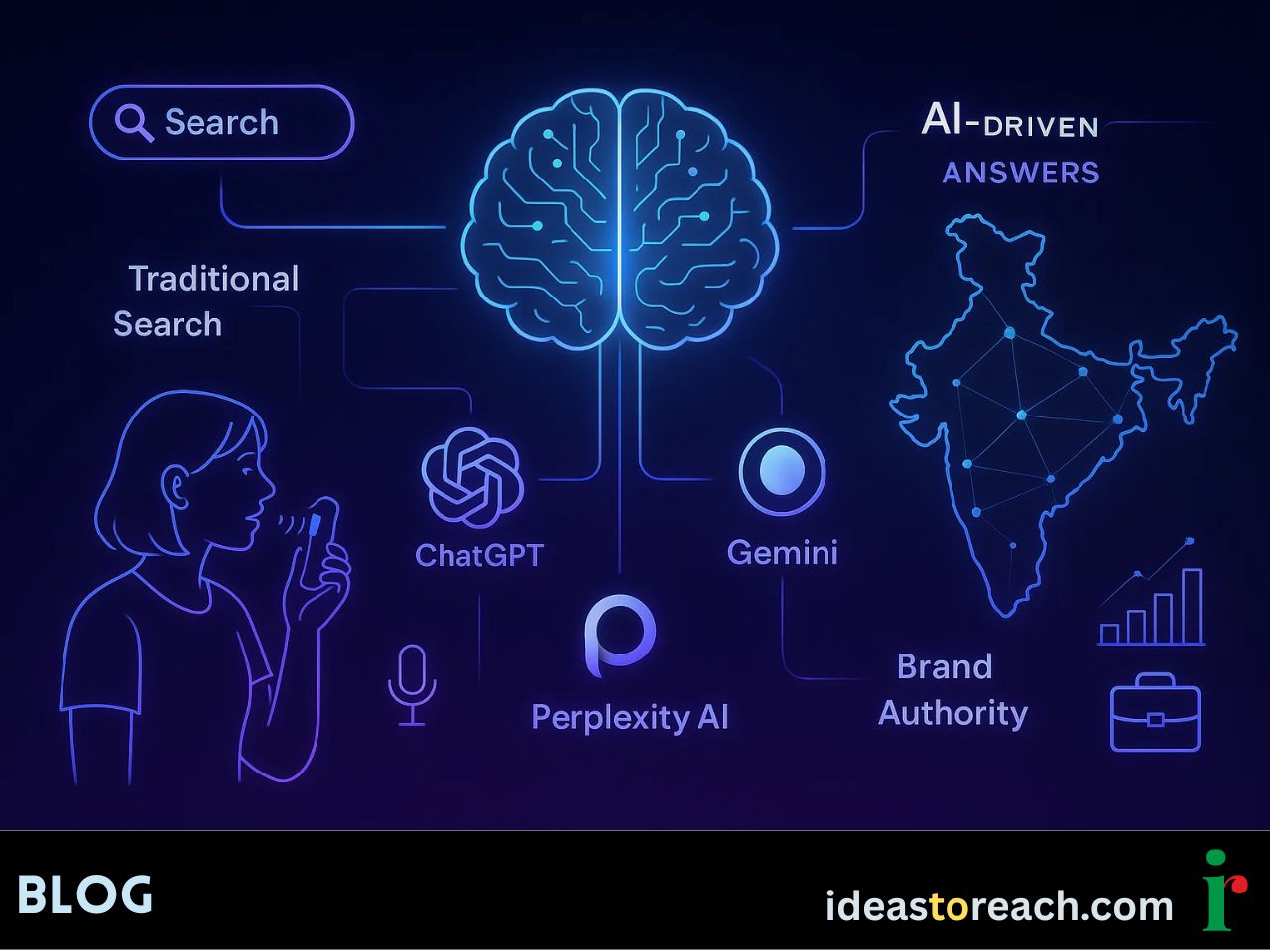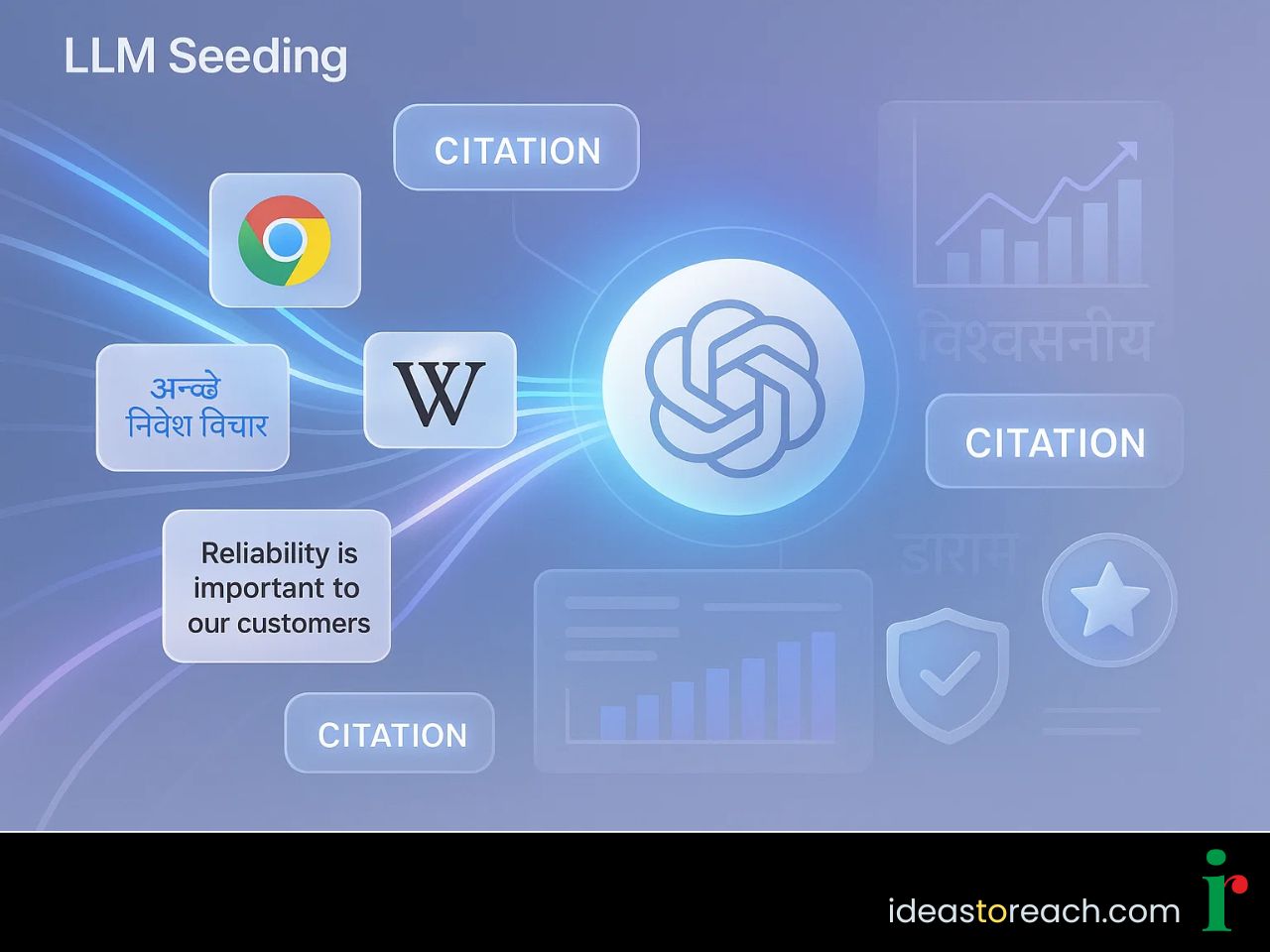
The future of search is shifting from traditional blue links on Google to AI-driven answers delivered directly through large language models (LLMs) like Gemini, ChatGPT, and Perplexity AI. For Indian businesses, this shift presents both challenges and extraordinary opportunities. To master this transformation, brands must embrace a new AI SEO strategy that ensures their content not only ranks on search engines but also gets cited within AI-generated responses. This blog explores how LLM seeding works, why brand authority is paramount, and what strategies businesses in India can use to dominate the AI-driven search ecosystem.
Search behaviour is evolving rapidly as conversational AI search engines, such as Google’s Search Generative Experience (SGE), and platforms like Claude and Perplexity AI, gain traction. Instead of clicking through multiple results, users increasingly expect summarised, accurate, and authoritative answers generated directly by AI systems.
This trend presents brands with a groundbreaking opportunity for increased visibility: appearing as a cited source within AI-generated answers. For businesses in India, optimising for AI means preparing for AI Answer Engine Optimization, understanding voice AI search trends, and aligning strategies with machine learning algorithms that decide what content AI trusts and references.
LLM seeding refers to the practice of creating credible, high-quality content that large AI models use as part of their training data or real-time retrieval when generating answers. If done correctly, AI systems like OpenAI’s ChatGPT or Google’s Gemini will quote, cite, or paraphrase your brand’s content when delivering user-facing responses.
This is the evolution of SEO — from ranking on the search engine results page (SERP) to becoming the source that AI itself pulls information from. To succeed, you must combine content strategy, digital PR, structured data, E-E-A-T, and authoritative mentions both within and beyond your website.

A robust AI SEO strategy ensures that when AI models answer queries, your brand is included in citations, improving both awareness and trust. Unlike traditional ranking models, generative AI prioritises content accuracy, expertise, and transparency of sources.
Here’s why this matters:
Traditional SEO focuses on keywords, backlinks, and on-page optimisation to secure positions on SERPs. A Generative AI SEO Strategy goes beyond this by positioning your brand within AI’s knowledge graph and context layers.
Key differences include:
For Indian brands preparing for Google SGE optimisation, this means learning how LLMs influence Google ranking factors. This includes trustworthiness, credibility, originality, and contextual reinforcement, which is now outweigh mere keyword repetition.
Consider implementing the following strategies to increase brand mentions in AI answers and secure visibility within conversational AI:
Here are the proper steps to optimize for AI-powered search engines:
When designing a Generative AI SEO strategy, Indian businesses should adopt these practices:
Focus on making your brand part of Google’s Knowledge Graph and other machine-readable data sources.
Create content structured to answer questions like: How to get my website featured in AI answers? Include breakdowns, FAQs, and conversational phrasing.
Use AI tools to anticipate what queries users might ask in future. Indian brands should explore the best AI SEO tools for Indian businesses to enhance predictability.
Explore techniques like leveraging AI for traditional link building to strengthen authority signals.
Align with evolving ranking systems by leveraging AI for traditional link building to strengthen authority signals.
Even link-building strategies must evolve as traditional link spam won’t work in AI-driven search. Instead, focus on adapting your SEO strategy to algorithm changes This future-proofs your presence in AI and organic web search.
For businesses targeting LLM Optimization in India, brand authority is the ultimate currency. Whether you are in finance, healthcare, education, or e-commerce, being perceived as a trusted Indian source for factual data positions you ahead when conversational AI answers queries.
Strategies include:
E-E-A-T is no longer optional, but it’s foundational. AI models are trained to avoid hallucinations and misinformation by trusting signals of expertise and reliability. Indian businesses must double down on:
If a business ignores these, AI will deprioritise its content in favour of stronger authority competitors.
SEO in India is already moving towards AI-driven digital marketing. With Apple rumoured to release an AI Answer Engine in 2026, the race is on for brands to dominate these emerging ecosystems.
Indian businesses must now prepare for AI-driven search by combining structured SEO foundations with bold Generative AI SEO strategies that prioritise visibility inside AI itself. The question is no longer "Will Google AI replace SEO?" but "How do we adapt?" — as explained in how Google’s AI is reshaping the role of SEO.
LLM seeding represents the next frontier of SEO. Indian businesses that master AI SEO strategies today will be the brands AI systems cite and reference tomorrow. By aligning your generative AI SEO strategy with structured data, E-E-A-T principles, and digital PR visibility, you won’t just rank. However, you will be trusted, cited, and amplified across AI-driven search engines. Now is the time to establish brand authority in the AI era and secure your position in the future of search.
LLM seeding is creating authoritative, trustworthy content designed to be included in Large Language Models’ training data. The objective is for AI platforms, such as Google’s Gemini or OpenAI’s ChatGPT, to cite your brand as a reliable source in their responses.
Traditional SEO focuses on ranking in search engine result pages (SERPs) through keywords and backlinks, while Generative AI SEO prioritises becoming a trusted source AI cites in answers. It values E-E-A-T, credibility, and factual accuracy over simple click-driven metrics.
To get cited by AI in India, publish E-E-A-T-driven content such as case studies, original research, and detailed guides. Enhance visibility on respected Indian publications, Wikipedia, and industry platforms to establish credibility within the AI training data space.
Brand authority signals credibility and trustworthiness, which LLMs prioritise when generating answers. Strong authority, supported by expert content, reviews, and mentions on reputable sites, increases the likelihood that your brand will be cited and trusted in AI responses.